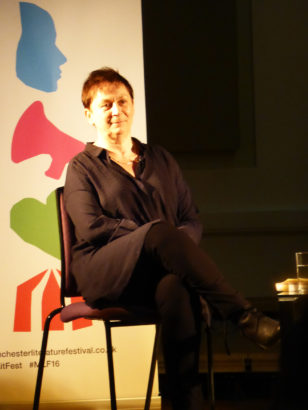 MLF Chapter & Verse
MLF Chapter & Verse
The Manchester Literature Festival Blog
Review: Anne Enright
“You don’t really know why you’re going to write something the way you do until afterwards.”: Our blogger Phil Olsen headed to Hallé St Peter’s to hear Anne Enright reading and discussing her latest novel The Green Road, at this year’s Festival.
Standing under the arches and the half-dome of Hallé St Peters, Centre for New Writing Co-Director John McAuliffe introduced the celebrated Dublin-born writer, Anne Enright. Her novel The Gathering won the Man Booker Prize in 2007, but she was already well regarded “before she was Bookered”, having won the Rooney Prize for Irish Literature back in 1991.
Anne began by giving a reading from her most recent novel, The Green Road. Clearing her throat before standing at the lectern she said “I’ll have some nervous water… Writers’ water.” It seemed to do the trick – everything that followed oozed confidence.
Introducing the novel, Anne told us that Rosaleen is a difficult mother who decides to sell the house once her children have all left. Each section of The Green Road follows the point of view of one of the siblings. Hanna, for example gives us the view of a child growing up in small town County Clare in 1980. She watches her brother Dan as he gets a rush of blood to the head and a sudden urge to become a priest following the Pope’s visit. Anne compared the frenzy around the Papal visit to that of the Irish property boom pre-2008; over-excitement that can’t be sustained. Everyone wanted to be a priest… for three months.
The passage Anne read to us was about the family preparing for Christmas. She apologised for it being a bit early, but then justified it with “Decorations were in the damn shops already when I was walking round Manchester, earlier.”
The characters are alive with their respective anxieties, which Anne demonstrated in her reading with a range of voices and dramatic pauses. Cutting up an apple tart into six slices, Hanna is completely thrown when her father says she can count him out. How is she going to cut five slices?
The mother seems more controlled. Feeling blessed with a loving family and an attitude of ‘I’m so lucky to be here’, she is happy to overspend at the supermarket. “The bill came to 410 Euros. A new record.” Her shopping list is hilarious and there’s room in the trolley for some pathos, too: “More out of habit now the children were grown, she got packs and packs of batteries.”
After the reading John asked Anne about the novel’s multiple characters and viewpoints, which Anne attributed to masses and masses of research, a lot of which went by the wayside. Thematically, male characters in the novel tend to leave without looking back, while female characters look like they spend more time caring for other people than themselves. When asked why Dan’s chapter is written in the slightly unusual first person plural, Anne replied: “You don’t really know why you’re going to write something the way you do until afterwards. Dan’s character didn’t have a language; he was from the West of Ireland, and then suddenly in New York. The communal voice matched the spirit of what was going on in his life at that point.”
Quizzed on the choice of setting her work in a contemporary time and place, Anne had a rather philosophical response: “We’re all writing historical fiction one way or another, even if that history ended yesterday.”
Expertly evading the question ‘What are you writing next?’, Anne ended an enjoyable evening by quipping: “I’m writing my name on the books that people are buying!”
___
Phil Olsen won Writing on the Wall’s WoWFest 2016 flash fiction competition and Book Week Scotland’s 2014 flash fiction competition. You can follow him on Twitter @Liverpolsen.
